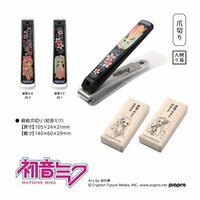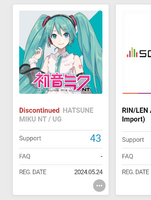I understand why some fans might feel disappointed, but let's not forget some things:
- Wataru Sasaki during the NT announcement made it clear that it wasn't an easy path for them, but it was needed. It was simply that Vocaloid of Yamaha was moving in a direction different from Crypton.
- wat-san is responsible for everything regarding Miku, both the software side and the collaboration with other companies. And he's not a PR person, so what he says is what truly is. If the next update is in 6 months from now, he says it.
- Crypton is not the size of a corporation like Yamaha, and so can't have that kind of resources. Some of you might be surprised to know the difference in size between Crypton and Yamaha. And just recently Crypton hired a few more staff for Piapro Studio UI, and they also renewed the office space a little. Everything takes time, and is normal during a development that there are some delays and changes.
- Crypton keeps supporting previous versions of Vocaloid, and for NT they are doing their best, and is not fair to compare them with other voice synth companies when it comes to software development. They can't take risks others might take, the user base and the number of songs made with Miku and all Piapro characters is just different.
Some of this is a little conjecture on my part, since my info is the same as anyone else's. But this post reminded me of a few things, too.
To begin with, CFM is involved with a lot of different areas, but until they started work on NT, I don't believe they worked directly on creating a vocal synth engine from the ground up. They would have worked with Yamaha in some capacity during the development of the Cryptonloids, but that work would have relied on the vocal synth engine that Yamaha had already created. Which I assume, since Yamaha basically invented it, they did at their leisure and released when it was as ready as they wanted.
Why NT was created/released in the timeframe it was, I couldn't tell you. The vocal synth market was getting much more crowded then, and apparently there was some reason that it was decided that it was best to start making the transition to a Yamaha-independent engine at that point based on some knowledge of Yamaha's plans. We'll probably never know all the details, so it's hard to second-guess those decisions--perhaps they were good, perhaps something could have been done better.
Second, technology only looks like magic when it works. I've had the opportunity to interact with technologists from a number of fields at various times, and the truth is this: there is no magic. When tech works, it can be smooth and seamless. When it doesn't, it can be infuriating, inflexible, and impenetrably obtuse. Anyone who has struggled with their computer, dvd/blu-ray player, Alexa, or what have you will have some familiarity with this. A second bit of truth is that it's little different for the tech workers who work with it daily. Sure, they have hopefully been taught the principles of how to work with whatever it is (although often not; it's basically a given that they'll have to learn on-the-fly by doing and figuring stuff out, even if that just means filling in all the things that wouldn't get included in a class), but everything beyond that is experience--learning how to work with the platform they have available and avoid all the little gotchas that are part of creating in that world. Because, remember, the platform they're working with was created by people, too, so it's not perfect, either.
The number of people with first-hand experience creating a vocal synth engine from scratch must be very small. And even for one of them, I imagine the task of trying to do that on their own would have been quite daunting, since Yamaha probably had a team of people doing the job, each working on their own individual parts. To take any one/a few of them and ask them to recreate the whole would be a large ask.
- Crypton keeps supporting previous versions of Vocaloid, and for NT they are doing their best, and is not fair to compare them with other voice synth companies when it comes to software development. They can't take risks others might take, the user base and the number of songs made with Miku and all Piapro characters is just different.
NT's compatibility with the Vocaloid-based stuff is something I've noticed since the NT page appeared on Sonicwire. CFM seems to have gone to a bit of trouble to try to create continuity between the older generation and the new one:
- Maintaining the working relationship with Yamaha (compatibility isn't necessarily the only reason for this, but it might be part of it)
- The fact that NT can use VSQx files
- NT's continuing use of X-SAMPA
NT is basically being asked to be a new-built engine that doesn't lean on Vocaloid that achieves improved results while still being able to work with the outputs of things created with Vocaloid. Otherwise, the new platform would basically wipe the slate and relegate all the Vocaloid-based content to legacy status. For whatever difference it makes, it's also continuing to use the original Miku samples. That seems to me like something of a tall ask, as well. We can argue for/against the merits of this backwards compatibility, but I think there's some merit to not wanting to trash those 16 years of vocal synth content, as well as leave cover artists with only the option of creating stuff from scratch. On the flip side, that does mean that I'd guess the software will probably never convert to using Arpabet exclusively; possibly it could be made bilingual somehow?
Having said all that, a lot of people feel understandably disappointed. It's a dear wish of mine that the platform will enjoy a turnaround and develop into what we hoped it would be. My primary focus is really on hoping to see that happen and how it can happen without stirring up the negative feelings that accompany each small announcement like this. Because I really don't know enough to second-guess the various decisions that were made along the way, nor do I particularly want to dwell mentally in that space.
























